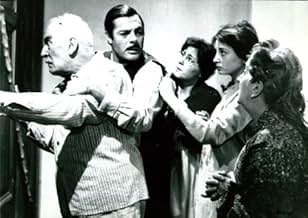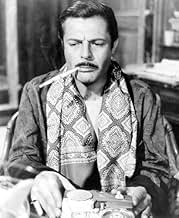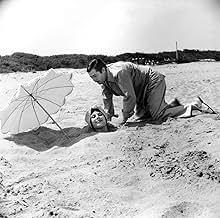VALUTAZIONE IMDb
7,9/10
15.165
LA TUA VALUTAZIONE
Un barone siciliano sposato si innamora della cugina e promette di sposarla, ma la pratica del divorzio non è legale e deve pertanto escogitare un delitto passionale per eliminare sua moglie... Leggi tuttoUn barone siciliano sposato si innamora della cugina e promette di sposarla, ma la pratica del divorzio non è legale e deve pertanto escogitare un delitto passionale per eliminare sua moglie.Un barone siciliano sposato si innamora della cugina e promette di sposarla, ma la pratica del divorzio non è legale e deve pertanto escogitare un delitto passionale per eliminare sua moglie.
- Regia
- Sceneggiatura
- Star
- Vincitore di 1 Oscar
- 12 vittorie e 9 candidature totali
Recensioni in evidenza
DIVORCE Italian STYLE is one of the funniest films I've ever seen on the subject of how to dissolve a marriage--Italian style, of course. Seems those Italians have a way of forgiving murder if the spouse has cheated and is found in the act--which must give rise to some pretty unsavory stories in real life as well as here.
But however unpleasant the subject matter may seem, this is the merriest romp of a comedy I've come across in a long time. It's so artful in the way it gets inside the mind of the impoverished aristocrat (MARCELLO MASTROIANNI) living in palatial ruins in Sicily and desperately devising a way to get rid of his boring wife. He devises a plan that goes awry when "La Dolce Vita" comes to town and, with all the men in the village attending it, his wife takes that opportunity to run off with her lover.
It's a masterful job that Mastroianni does here, giving little signs of distress with a twitch of his mustache, a frown, a concentrated gaze--in other words, bewitched, bothered and bewildered as he contemplates how to go about getting rid of his freedom so he can pursue a young girl he's enamored of. All the events leading up to the final act are hilariously Italiano in style--those little devils knew how to take advantage of the judicial system.
Summing up: A sheer delight from beginning to end, thanks to a masterful job by Marcello Mastroianni in his Oscar-nominated role.
But however unpleasant the subject matter may seem, this is the merriest romp of a comedy I've come across in a long time. It's so artful in the way it gets inside the mind of the impoverished aristocrat (MARCELLO MASTROIANNI) living in palatial ruins in Sicily and desperately devising a way to get rid of his boring wife. He devises a plan that goes awry when "La Dolce Vita" comes to town and, with all the men in the village attending it, his wife takes that opportunity to run off with her lover.
It's a masterful job that Mastroianni does here, giving little signs of distress with a twitch of his mustache, a frown, a concentrated gaze--in other words, bewitched, bothered and bewildered as he contemplates how to go about getting rid of his freedom so he can pursue a young girl he's enamored of. All the events leading up to the final act are hilariously Italiano in style--those little devils knew how to take advantage of the judicial system.
Summing up: A sheer delight from beginning to end, thanks to a masterful job by Marcello Mastroianni in his Oscar-nominated role.
There's a moment in Pietro Germi's Divorzio all'italiana (aka: Divorce Italian Style) that pretty much defines everything, that sort of defines what a black comedy is all about: a certain woman murders her husband because he had run away with another woman, that certain woman murdered him while he was out with his new love. And that certain woman had something similar with our main character, Marcello Mastroianni's Baron Ferdinando Cefalù, and actually after the murder she crossed path with Ferdinando. The moment that sort of defines everything is when these two, the certain woman and our main character, are together since is Mastroianni delivering a really great laugh, is Ferninando being like "" ...certainly and certainly is the way that Mastroianni delivers the scene that makes it so fantastic and hilarious.
10Denis M
This is definitely one of the best Italian comedies ever made, a movie you can watch over and over again... Mastroianni gives an excellent performance as an impoverished Sicilian aristocrat determined to get a divorce from his wife. There is only one complication - divorce is illegal in Italy at the time. However, there is also a law that justifies the killing of a wife if she is caught during an act of adultery. As with most others Germi's films, this one is a unique mix of situational comedy and social drama. Highly recommended.
(Note: Over 500 of my movie reviews are now available in my book "Cut to the Chaise Lounge or I Can't Believe I Swallowed the Remote!" Get it at Amazon.)
Divorzio all'italiana is a richly textured satire of Sicilian macho Catholic life styles starring one of Italy's greatest actors, Marcello Mastroianni. He is a bit Chaplinesque in this tongue in cheek exploration of how to dump your wife and marry your 16-year-old cousin. His wide-eyed, dead pan expressions combined with vulnerability and suave, leading-man good looks made him the heart-throb of women for decades. He plays a bored baron stuck with a baroness (played fatuously by Daniela Rocca) that he cannot abide. It should be noted that today it IS possible to get a divorce in Italy, but at the time it was very difficult, perhaps easier to get an annulment, and so we have the premise of the plot.
Stefania Sandrelli, who became one of the great ladies of the Italian cinema, plays the cousin. She was only 15 when the film was shot but could easily pass for, say, 18. She is sensual, sweet and a bit naughty. In the final scene, famous for its fitting irony, the last thing we see are her feet. I won't tell you more, but the movie is almost worth seeing just for that final scene.
Rocca's Rosalia on the other hand is more syrupy than sweet and would qualify as clinging. She could smother a lumberjack, and although it is not polite to comment unfavorably on a lady's looks, I must note that she seemed to be having a bad facial hair day, everyday. Her impersonation of a country baroness nonetheless was unforgettable. I also liked 16-year-old Margherita Girelli as Sisini, the maid. Her coquettish ways helped to lend a French bedroom farce flavor to the film.
But what really makes this one of the great monuments of the Italian cinema is the witty and delightful script by Ennio De Concini (it won an Academy Award in 1962) and the detailed, textured direction by Pietro Germi. The picture that Germi paints of life in a small Sicilian (or southern Italian, for that matter) village is picturesque, much imitated, and indelible. The crowded ornate clutter of the old estate, the sun-drenched streets and the monolithic stone and mason churches haunt our memory. True, the film starts a bit slowly and drags (at least for modern audiences) a bit at times, but don't make the mistake of giving up on this. The latter half of the film is wonderful. And remember, if you had to go to film school, Divorce Italian Style would be on the syllabus.
So see this for Mastroianni of course but also because no film education would be complete without having seen Divorzio all'italiana.
The Criterion Collection DVD includes a second disc with a documentary on Germi's career, an interview with Ennio De Concini, and screen-test footage of Stefania Sandrelli and Daniela Rocca that I just had to see. There is also a booklet with reviews of the film from Stuart Klawans, Andrew Sarris, and Martin Scorsese. Scorsese's review is adoring and nostalgic since he is from Sicily and since the film had made such a lasting impression on him as a 19-year-old. For him the film was not so much a comedy as a true reflection of a life he and his family had known. He writes, "Every detail in Divorce Italian Style is so truthful and right that all Germi had to do was heighten everything a bit to make it funny."
Divorzio all'italiana is a richly textured satire of Sicilian macho Catholic life styles starring one of Italy's greatest actors, Marcello Mastroianni. He is a bit Chaplinesque in this tongue in cheek exploration of how to dump your wife and marry your 16-year-old cousin. His wide-eyed, dead pan expressions combined with vulnerability and suave, leading-man good looks made him the heart-throb of women for decades. He plays a bored baron stuck with a baroness (played fatuously by Daniela Rocca) that he cannot abide. It should be noted that today it IS possible to get a divorce in Italy, but at the time it was very difficult, perhaps easier to get an annulment, and so we have the premise of the plot.
Stefania Sandrelli, who became one of the great ladies of the Italian cinema, plays the cousin. She was only 15 when the film was shot but could easily pass for, say, 18. She is sensual, sweet and a bit naughty. In the final scene, famous for its fitting irony, the last thing we see are her feet. I won't tell you more, but the movie is almost worth seeing just for that final scene.
Rocca's Rosalia on the other hand is more syrupy than sweet and would qualify as clinging. She could smother a lumberjack, and although it is not polite to comment unfavorably on a lady's looks, I must note that she seemed to be having a bad facial hair day, everyday. Her impersonation of a country baroness nonetheless was unforgettable. I also liked 16-year-old Margherita Girelli as Sisini, the maid. Her coquettish ways helped to lend a French bedroom farce flavor to the film.
But what really makes this one of the great monuments of the Italian cinema is the witty and delightful script by Ennio De Concini (it won an Academy Award in 1962) and the detailed, textured direction by Pietro Germi. The picture that Germi paints of life in a small Sicilian (or southern Italian, for that matter) village is picturesque, much imitated, and indelible. The crowded ornate clutter of the old estate, the sun-drenched streets and the monolithic stone and mason churches haunt our memory. True, the film starts a bit slowly and drags (at least for modern audiences) a bit at times, but don't make the mistake of giving up on this. The latter half of the film is wonderful. And remember, if you had to go to film school, Divorce Italian Style would be on the syllabus.
So see this for Mastroianni of course but also because no film education would be complete without having seen Divorzio all'italiana.
The Criterion Collection DVD includes a second disc with a documentary on Germi's career, an interview with Ennio De Concini, and screen-test footage of Stefania Sandrelli and Daniela Rocca that I just had to see. There is also a booklet with reviews of the film from Stuart Klawans, Andrew Sarris, and Martin Scorsese. Scorsese's review is adoring and nostalgic since he is from Sicily and since the film had made such a lasting impression on him as a 19-year-old. For him the film was not so much a comedy as a true reflection of a life he and his family had known. He writes, "Every detail in Divorce Italian Style is so truthful and right that all Germi had to do was heighten everything a bit to make it funny."
When I first saw Pietro Germi's movies (a long time ago), I thought he was a misogynist who portrayed women as grotesque monsters that make men's lives miserable. Thirty years later, after the women's movement, I have come around 180 degrees, and see him as a feminist before his time--showing how the patriarchal family destroys women (and men)and exposing the absurdity of "family honor"--and doing it with humor. It doesn't just apply to Sicily. The Sicilian setting and ambiance is a big part of this movie, however--watch for all the little details of gestures and interactions, and the great shots of the sunbaked town, baroque churches, and interiors of the decaying houses of the aristocrats. Mastroianni is terrific, and so is the supporting cast.
Lo sapevi?
- QuizThe "honor killing" law, which provided mitigating circumstances for anyone who killed his "spouse, daughter or sister" (or their lover) upon discovering them "in illegitimate carnal relations", was definitely abrogated in Italy in 1981, exactly 20 years after the release of this movie.
- BlooperWhen Ferdinando gets in bed with Rosalia after their fight, Rosalia's head facings change significantly between shots.
- Citazioni
Ferdinando Cefalù: Have you really got another headache?
- ConnessioniEdited into Lo schermo a tre punte (1995)
I più visti
Accedi per valutare e creare un elenco di titoli salvati per ottenere consigli personalizzati
- How long is Divorce Italian Style?Powered by Alexa
Dettagli
- Data di uscita
- Paese di origine
- Lingua
- Celebre anche come
- Divorce Italian Style
- Luoghi delle riprese
- Ispica, Ragusa, Sicily, Italia(the Cefalus' hometown)
- Aziende produttrici
- Vedi altri crediti dell’azienda su IMDbPro
Botteghino
- Lordo in tutto il mondo
- 131.467 USD
- Tempo di esecuzione1 ora 45 minuti
- Colore
- Proporzioni
- 1.85 : 1
Contribuisci a questa pagina
Suggerisci una modifica o aggiungi i contenuti mancanti

Divario superiore
By what name was Divorzio all'italiana (1961) officially released in India in English?
Rispondi
![Guarda Trailer [OV]](https://m.media-amazon.com/images/M/MV5BY2IwZTI1YmUtNTg4YS00OTNlLTkyYjUtZTE5ZjA5MTc4OGI1XkEyXkFqcGdeQXRyYW5zY29kZS13b3JrZmxvdw@@._V1_QL75_UX500_CR0)














